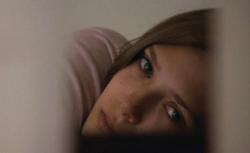Martha Marcy May Marlene (Fox Searchlight), the first feature film of writer/director Sean Durkin, took a good hour to start really getting on my nerves. Up till then, I kept cutting this maddening little psychological thriller break after break, because it has the outer form of a promising debut: It’s restrained, elliptical, and deliberately paced, with luminous cinematography by Jody Lee Lipes and a riveting lead actress in Elizabeth Olsen. (The 22-year-old Olsen is the younger sister of Ashley and Mary-Kate, the TV-twins-turned-fashion-moguls whose perky brand identity couldn’t be further from this movie’s stubborn gloom.) The problem with this would-be study of a Manson-like cult and its effect on the life of a mentally unstable woman is that the final result (especially, but not exclusively, the ending) is too elliptical. It’s one thing for a work of art to ambiguously reveal depths of emotion and meaning; it’s something else again to dangle the promise of meaning that never arrives.
Still, I suspect Martha Marcy May Marlene will find its fans, because its mood of unrelenting tension carries an effectively creepy charge. Olsen plays Martha, a young woman who drops off the grid after her mother dies. For reasons we never quite grasp, she cuts off all contact with her previous life and settles into a communal existence at an upstate New York farm with a charismatic middle-aged spiritual leader, Patrick (John Hawkes), and his band of young followers. These include a harem of attractive women, a few men, and whatever babies their couplings produce. The ritual induction into this society consists in drinking a drugged herbal milkshake and waking up mid-rape, but this and other disturbing acts of violence get cloaked in a mantle of soothing metaphysical doublespeak: “There is no such thing as being dead or alive,” a fellow harem member assures Martha, whom Patrick rechristens Marcy May. “There’s only existing.” Without giving away too much of the game when it comes to Patrick’s far-ranging perversities, I’ll say this: I’m glad the cats in that one scene remained offscreen.
In two concurrently running timelines, we switch back and forth between the radiant Marcy May of the commune and the shut-down Martha of the present day, who, having made her escape, seeks out her sister Lucy (Sarah Paulson) at the swanky Connecticut lake house she shares with her husband Ted (Hugh Dancy). Lucy and Ted welcome Martha with open arms, but it doesn’t take long to realize there’s something off in her demeanor. She refuses to explain where she’s been for the past two years, shows no motivation to find a job or a home of her own, and thinks nothing of wandering into the couple’s bedroom while they’re having sex and flopping down on the bed.
The interweaving of present and past in this middle section is convincingly dreamlike, especially in a scene where Martha, swimming in the lake at her sister’s, flashes on a sense memory of skinnydipping with her fellow cult members. There’s a long silent shot of naked bodies moving under murky water that’s both ominous and beautiful, like a half-remembered childhood memory. But these parallels between Martha’s experience and Marcy May’s never yield much insight about either her past or her present self. This shut-down woman’s inner state remains as inaccessible to us as it does to her sister and brother-in-law. The details of what happened on the farm, and what Martha fears may happen next, remain similarly opaque. At first this vagueness is tantalizing—what secret is Martha keeping, even from herself?—but by the time the truth about Patrick’s cult comes out, the movie has been holding out on us for so long that it starts to seem coy.
Occasionally, Martha emerges from her torpor long enough to a launch a tirade about her sister and brother-in-law’s materialist complacency. Are we meant to agree with Martha’s savage assessment of Ted and Lucy as soulless yuppies who, if their plan of having a baby works out, will be terrible parents? If so, the satire never lands; I felt nothing but sympathy for the straight-laced, well-intentioned Lucy and, toward the end, began to share her husband’s annoyance with her freeloading pill of a sister.
If Martha Marcy May Marlene manages to seem more complex and nuanced than it really is, the credit is largely due to Elizabeth Olsen. Though she’s able to invest the glumly affectless Martha with a surprisingly complex inner life, the role is too underwritten for the character ever to emerge fully. But Olsen is certainly an intense and arresting presence, with a round, freckled face, fathomless blue eyes, and a growly alto voice (not unlike the young Kathleen Turner’s) that makes everything she says sound faintly, defensively sarcastic. She’s impossible to stop watching, and casting directors must be camping outside her door.
Having John Hawkes play a scary pastoralist cult leader was one of the great casting ideas of the decade, which only sharpens the disappointment at the role’s wasted opportunity. The lanky, hatchet-faced Hawkes (unforgettable as Jennifer Lawrence’s hillbilly uncle in last year’s Winter’s Bone) owns every scene in which he appears, but Patrick also remains a blurry, ill-defined figure. In sheer terms of time on-screen, we don’t see enough of this man to get what he meant to Martha/Marcy and the rest of his followers, how he slowly drew them into his web of shared hallucination. Only one scene offers a glimpse into the Patrick mystique, a hint of why Martha was so quick to subsume her identity to his: When Patrick picks up an acoustic guitar in front of his rapt followers and sings an obscurely menacing song (“Well, she’s just a picture/ Who lives on my wall”) that he calls “Marcy’s Song.” Like Lily Tomlin watching Keith Carradine in the great bar scene in Nashville, Martha-turned-Marcy looks on in astonishment, convinced this smooth operator is singing for her and her alone.
